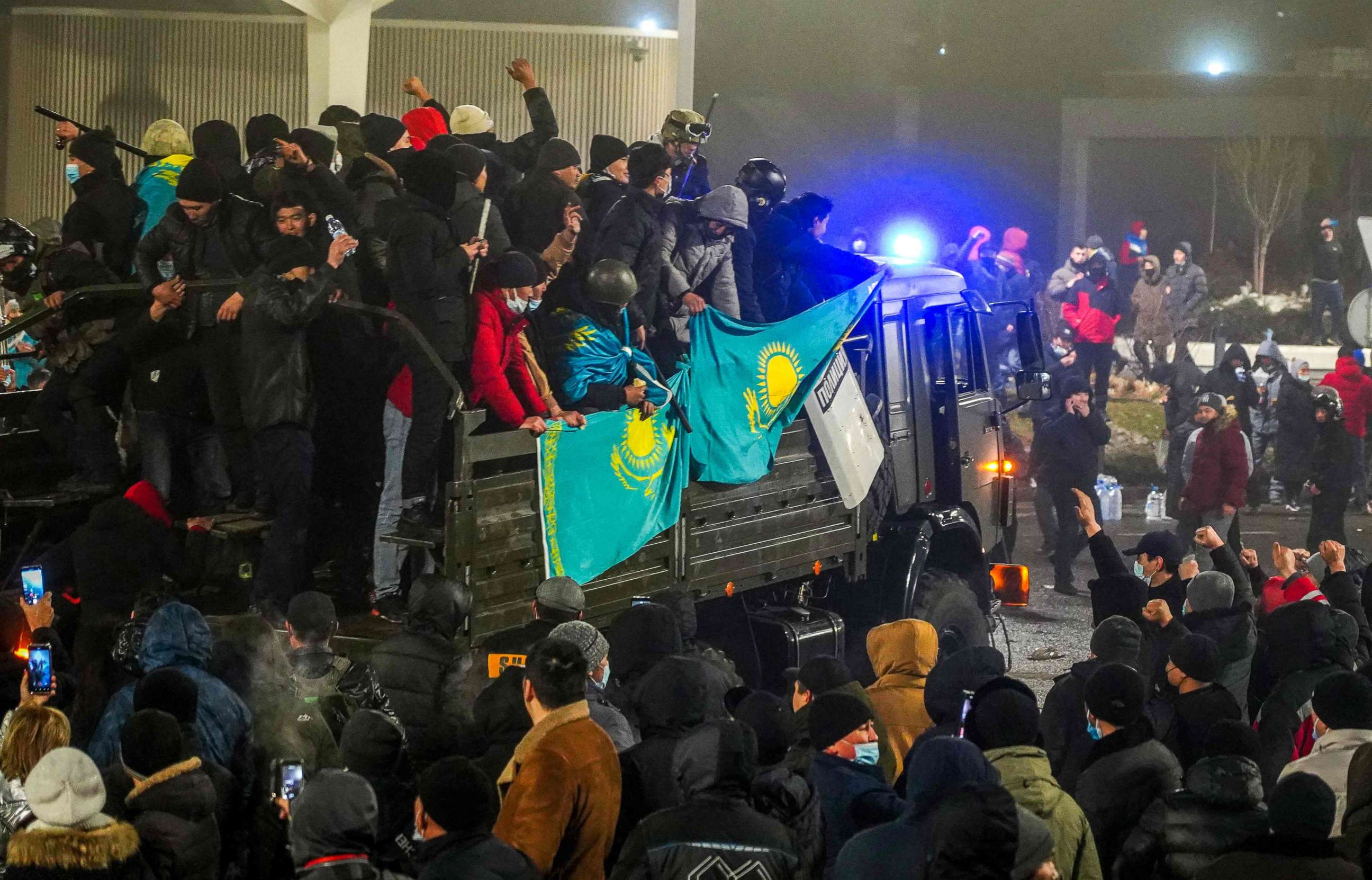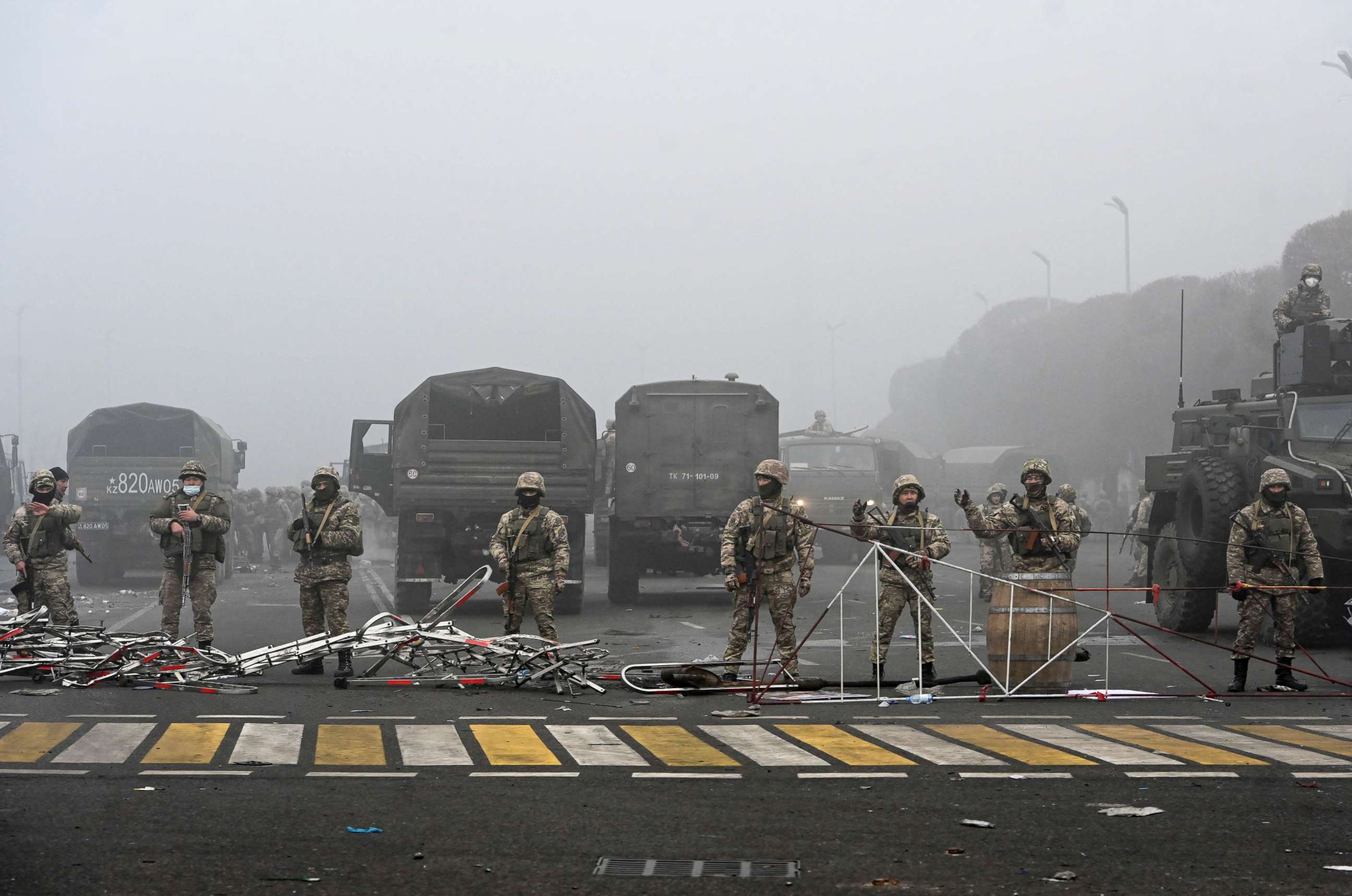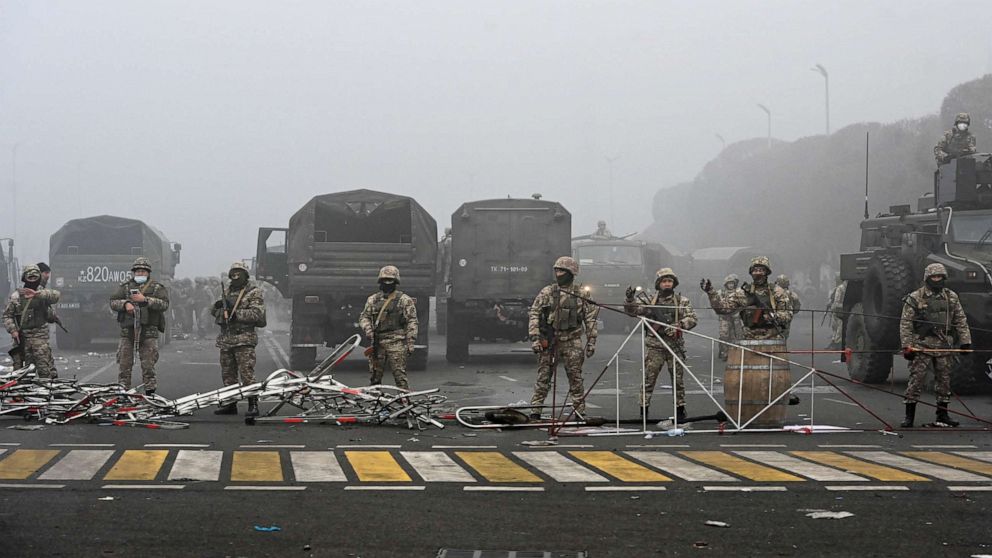Russian troops arrive in Kazakhstan, as dozens of protesters killed, thousands arrested
Russian paratrooper units have begun arriving in Kazakhstan to help its president end mass protests in the Central Asian country, as security forces there said they have killed dozens of protesters overnight amid violent clashes.
The Russian troops are deploying as part of a joint force from a Russian-led military alliance of former Soviet countries, after Kazakhstan’s president appealed late Wednesday for help putting down the protests that have spread across the country. President Kassym-Jomart Tokayev made the request after a mob of protesters stormed the mayor’s office in Kazakhstan’s largest city Almaty, and overran the airport.
Small numbers of Russian paratrooper units landed at an airbase in Kazakhstan, with Russian state media showing the soldiers disembarking from transport planes and off-loading armored vehicles. The number of Russian troops was unclear, but it was estimated from several hundred to a few thousand, alongside several hundred from Belarus, Tajikistan and Armenia that were also due to arrive.
The Russian-led alliance, the Collective Security Treaty Organisation (CSTO), said it was deploying what it called a “peacekeeping” mission to help Kazakhstan’s government restore order. The organization said the forces’ main tasks would be “protecting important state and military facilities, and assisting Kazakh law enforcement in stabilising the situation."
Kazakhstani government troops moved to regain control in Almaty on Thursday, with videos published by local media showing them opening fire on protesters. Shooting was reported throughout the day, focused mainly around the city’s main square in front of the mayor’s office, according to local residents. A nationwide state of emergency has been declared and the internet has been repeatedly shut off, according to reports.
The interior ministry said over 2,000 people had been arrested in Almaty and late Thursday it said it had “cleared” the city’s square. In a statement it warned that protesters that did not lay down their weapons would “be destroyed”.
Saltanat Azirbek, a police spokeswoman, said dozens of people had been killed, when they allegedly attacked administrative and police buildings Wednesday night. Kazakhstan’s interior ministry said 18 police and security forces personnel had been killed and 748 injured. State media reported hundreds of people have been injured in the unrest.

President Tokayev has vowed to use force to put an end to the protests, after concessions on Wednesday-- including dismissing his government and reversing the fuel price rise-- failed to calm them. Tokayev claimed the protests were being led by foreign terrorists groups, using the claim to justify his call for the Russian-led alliance to send troops.
A major energy exporter and one of the world’s largest countries, Kazakhstan’s regime is a close ally of Russian president Vladimir Putin, which considers the ex-Soviet country to be a key part of its sphere of influence. The CSTO alliance was created after the fall of the Soviet Union and this was the first time it has acted to send troops to one of its members.
The Russian intervention was the second time in a year and a half the Kremlin has acted to rescue an authoritarian leader from a mass uprising in one of its key neighbors, after Putin helped prop up Belarus’ leader Alexander Lukashenko against huge protests there.
It was unclear whether the Russian troops would be deployed near protests, which could see them firing on Kazakhstani civilians, an inflammatory scenario the Kremlin likely wants to avoid. The CTSO’s general secretary Stanislav Zas told Russian state media the “peacekeepers” could remain in Kazakhstan as long as was required to stabilise the situation, saying they would be deployed to the cities where they were needed.
The U.S. Secretary of State Anthony Blinken called Kazakhstan’s foreign minister Mukhtar Tileuberdi on Thursday to discuss the unrest. Blinken “reiterated the United States’ full support for Kazakhstan’s constitutional institutions” and “advocated for a peaceful, right-respecting resolution to the crisis,” according to a State Department readout. But he notably did not condemn the violence used against protesters.
An internet blackout made it difficult to access the state of the protests on Thursday, although connection was restored later in the day. In Almaty, the center of the uprising, most of the city was eerily quiet on Thursday with little sign of protesters, according to an ABC reporter in the city. Intense shooting was reported early evening around the main square, where journalists on the ground said government armored personnel carriers and troops had opened fire on some protests gathered there.
Witnesses said Almaty’s city center was a scene of devastation, dotted with burnt out vehicles and ransacked shops, following widespread looting overnight. Numerous residents told media the city’s protests had been overtaken on Wednesday by gangs of mainly young men, looking for violence who had rampaged through key buildings and looted stores. A video filmed by the BBC showed the wreckage of the former presidential palace in Almaty, where cars had been rammed through its walls.
Authorities announced all banks were temporarily closed Thursday due to ongoing “counter-terrorism operations” and because of internet problems. In the capital, Nur-Sultan, local residents reported lines for bread and other foods.
Videos posted by local independent media showed small crowds of protesters in other towns and cities, including the western oil hub Zhanozen, where the protests over the fuel prices began five days ago.

Rising prices exacerbated by the pandemic have fuelled discontent in Kazakhstan. The protests were ignited after the price of liquified natural gas used in vehicles almost doubled. The demonstrations swelled into an unprecedented challenge to the regime created by Nursultan Nazarbayev, the former Communist party boss who has dominated the country since it gained independence during the Soviet Union’s fall.
Nazarbayev, who is 81, in 2019 handed power to Tokayev as his handpicked successor, but he retained substantial power behind the scenes by moving to become chair of the national security council and he was granted the honorary title of “leader of the nation." Under Tokayev, Nazarbayev’s cult of personality has continued, with the capital city, Nur-Sultan, named after him.
Protesters pulled down a statue of Nazarbayev on Wednesday in Taldyrkurgan, the Almaty regional capital. And demonstrators in many places chanted a Kazakh slogan meaning “Go away, old man!”
Tokayev on Wednesday announced he was taking over from Nazarabayev as head of chairman of the security council, in what appeared as a concession to the protests meant to signal a final end to Nazarbayev’s rule. Tokayev himself was named president in an election criticised by international observers as flawed.




